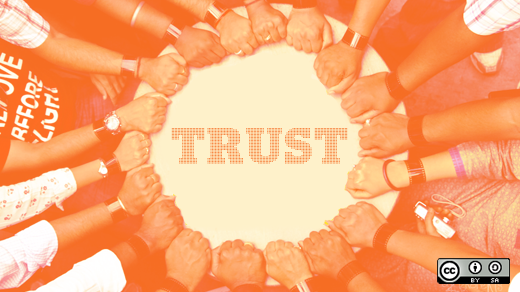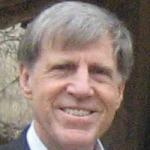Robin Dreeke spent most of his career in the U.S. Marine Corps and as an agent in the FBI. One of an FBI agent's most important goals is to acquire information from total strangers—and that requires extensive skill establishing trust.
Dreeke's recent book, The Code of Trust, outlines everything the author has learned about honing that skill. The book makes important points relevant to the study of open organizations, too. After all, if people are cooperative, engaged, interactive, and open, an organization with a lot of outside contributors can be very successful. But, if they are uninterested, non-cooperative, protective, reluctant to interact, and closed, an organization will suffer.
So you might say The Code of Trust is a book about getting people to be more open with you. In this review, I'll explain how Dreeke's writing can help people hoping to apply the principles of transparency, inclusivity, adaptability, collaboration, and community to their teams and organizations.
Know the code
The centerpiece of Dreeke's book is, of course, his "Code of Trust," so let me review that first.
The code has five rules of engagement that anyone wishing to inspire legitimate, lasting trust must embrace.
1. Suspend your ego
Each of us tend to focus on our own life. When building trust, however, you must totally focus on the other person's life and context (situation, desires, etc.). "To gain the gift of another person's trust, you must grant them that natural, normal focus," Dreeke says. When you suspend your ego to focus on your final objective, you'll feel fine about a small loss of ego.
2. Be nonjudgmental
"Respect the opinions, attitudes, ideas, and perspectives of other people," says Dreeke, no matter how different they may be from yours. "No one trusts people who look down on them, and no one trusts people who don't understand them." In many cases, your judgment might not even be important. What others think about themselves is, so just keep asking questions about them and how they feel.
3. Validate others
If you observe people carefully, you will find common decency in everyone—in one respect or another. To be worthy of trust, you must probe for exactly what that decency is and make sure the other person knows that you know what that decency is. From there, trust will emerge when you show them your sense of decency. Making sure people know you see their perspectives is very powerful. When they feel you understand them, they'll start to trust you. In open organizations, we must often manage our expectations, as many people are involved in projects and activities outside the open organization project. So we really need to understand contributors' priorities. The best way to avoid high expectations is to not have them or keep them to a minimum. When you manage your expectations, you will not feel pressure to perform the task one specific way (i.e., your way).
4. Honor reason
"Resist every temptation to personalize, emotionalize, debate, exaggerate, manipulate or coerce," Dreeke writes. Stick to the facts and be honest. Try to create a foundation of rational, shared self-interest. "Trust inspired by mere emotionalism last only as long as the next emotion," according to Dreeke.
5. Be generous
Don't expect people to trust you initially, even if you have a powerful title, reputation, or strong recommendation. Usually, trust is not one-sided. If you show them you can understand and trust them, they will start to trust you. Also, generosity is a two-way street—namely, sharing. "Long before the advent of agriculture—during the hunter-gather days of about 80,000 years ago—it was obvious to people that sharing food and shelter helped everyone survive," Dreeke says. It feels good to give something to someone—particularly if what you give is of little sacrifice to you but of huge value to the person receiving it. If you can look for problems people have (which they usually hide from people, sometimes even themselves) and then generously help them overcome the problems, you'll build trust.
Building your network
According to Dreeke, following the Code of Trust can help you build "trust networks" (what we might call "open organization communities"). These networks are like a "hub and spokes," in which each person is a hub with trusted people directly connected around him (the spokes). The more of these spokes you have, the more powerful your network (or community). Also, the more the spokes your trusted spokes have, the more powerful your network.
These trust networks are exactly what we would like to develop when building open organizations of any kind, and Dreeke's book offers plenty of good ideas for doing just that. In the next part of this review, I will outline Dreeke's specific instructions for putting the Code into action.
Watch the review






2 Comments